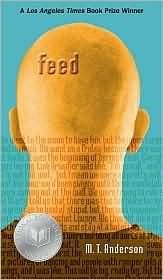
Feed, by M. T. Anderson, is a young adult book that takes a look at a future dystopia in ways reminiscent of George Orwell’s 1984 and Ray Bradbury’s Fahrenheit 451. The world is a mess and the human race is so focused on their ‘feeds’ that nothing else matters.
The ‘feed’ from the title of the novel refers to physical hardware inserted into the brain during childhood and the software information that patches through to that hardware. In the novel, corporations control everything. Citizens are told what to buy and what to like and are pacified through material means. All of the information available to the human race is constantly streaming through the feeds, and it is all controlled by corporate business.
Imagine this. Imagine that you could have the internet connected directly into your brain. Imagine that every waking moment you have access to Google, iTunes, and instant messengers inside of your brain. Sounds good, right?
But if it’s all streaming through your brain, do you ever have to remember anything? How can you tell what’s real and what isn’t? There are no pop-up blockers or ad blockers. You get a constant stream of advertisement flitting through your consciousness, even while you’re sleeping. How can you think with all of that going on in there?
Feed is the first person narrative of Titus, a normal teenage boy growing up in that world. He does all the things his friends do -- follow ridiculous fashions, rent crappy hotel rooms on the moon for Spring Break, go to clubs hoping to pick up chicks -- until he meets a girl named Violet. She’s different; she pauses and takes a look at why people do the things they do. After experiencing time without the feed due to a hacker, Violet decides she’s going to try to think for herself.
This book blew me away. I could not put it down, even though it honestly frightened me. When you start reading the book, these people’s lives are so alien. They have a different vocabulary and a different way of speaking. It’s tough to understand at first, but as the novel progresses and as Titus learns more, his speech becomes much more like our own. The book becomes easier to understand and the truths about that world that we learn are quite horrifying.
I’ll be honest. After finishing this book, I never wanted to look at a computer again. I had to shut down my laptop and throw my iPod and mobile phone into a drawer before I felt comfortable in my own bedroom. Anderson’s writing really brings that world to life and makes the possibility of our own world turning into that world all the more real. I could see it happening.
Even though this book affected me negatively directly after reading it, I am glad that I did. I’d recommend this book to anyone. It takes a hard look at our materialistic society and what it could become. It makes you think about why we do the things that we do, and I believe any book that can manage that should be read.






2 comments:
It seems like they wouldn't have to talk. They would probably use some form of telepathy.
@MagicalIdiotSquigoo
If I remember correctly, they did both and seemed to use them interchangeably.
Post a Comment